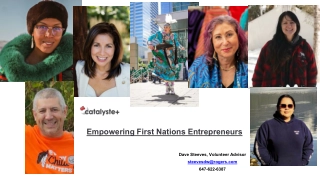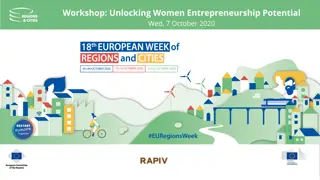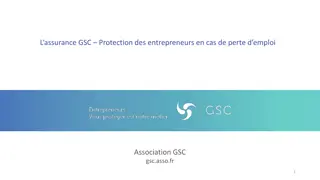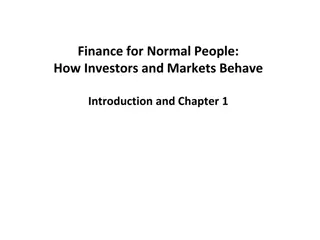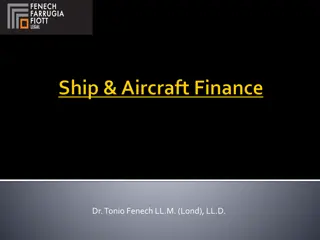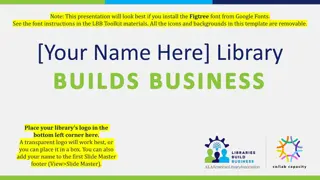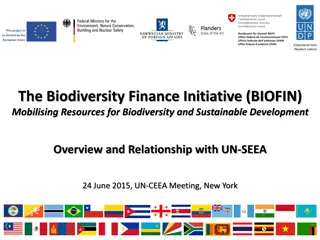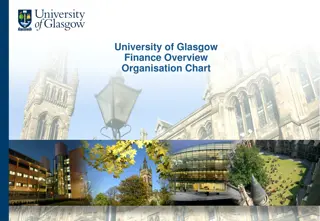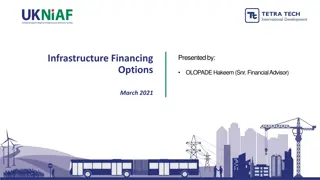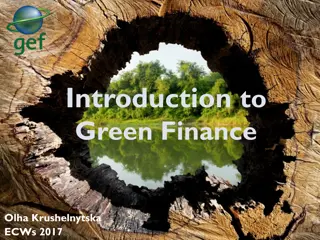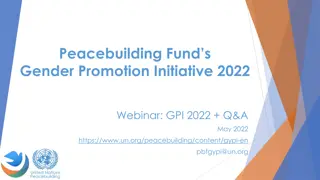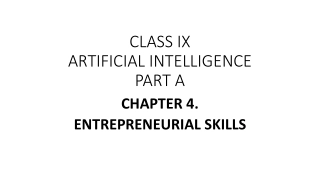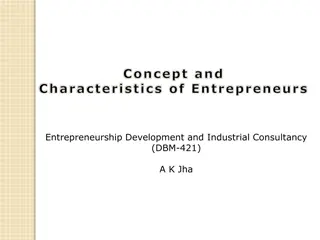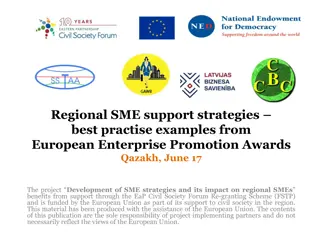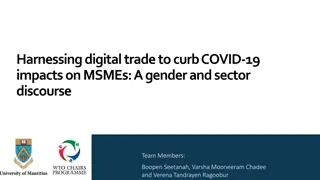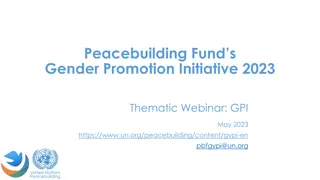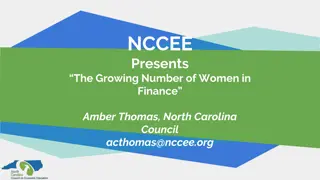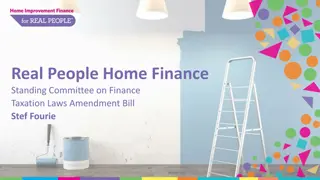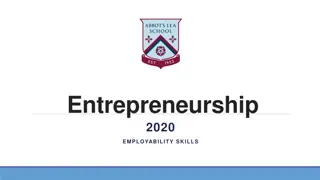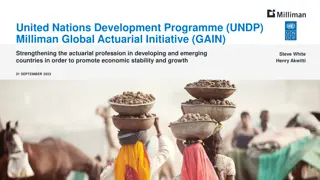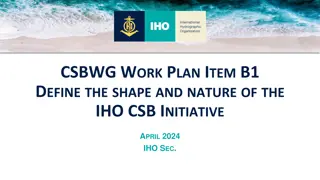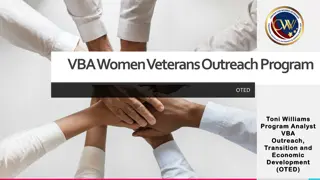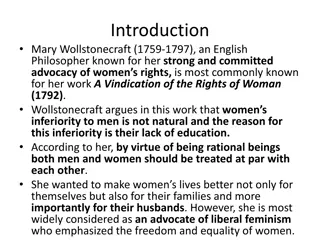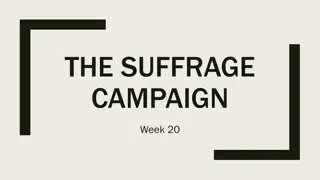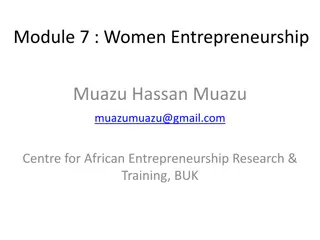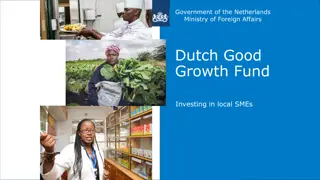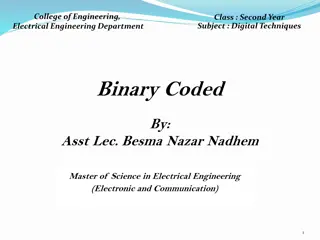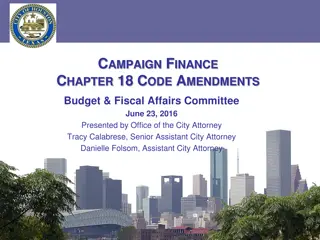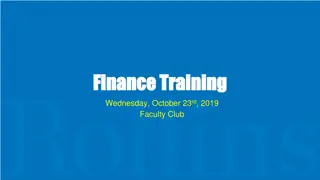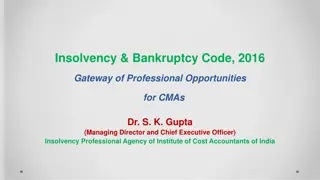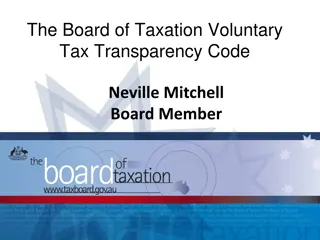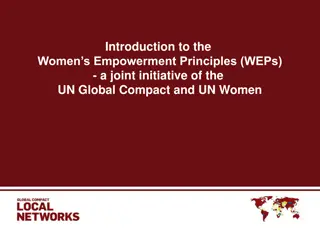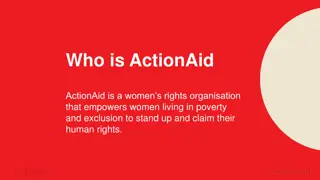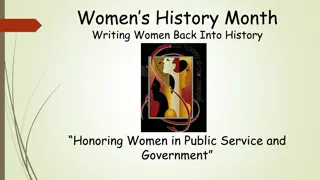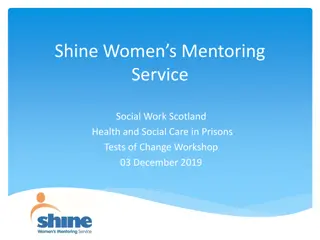Women Entrepreneurs Finance Code Initiative Overview
The Women Entrepreneurs Finance Code is a global effort aimed at expanding financial support for women entrepreneurs by engaging various stakeholders, catalyzing new mechanisms, improving data collection, and mobilizing capital. This initiative, launched in partnership with We-Fi, focuses on closing financing gaps, promoting gender equality, and enhancing data-driven decision-making. Participants include financial service providers, regulators, investors, and organizations piloting the initiative in 24 countries to drive impact and empower women economically.
Download Presentation

Please find below an Image/Link to download the presentation.
The content on the website is provided AS IS for your information and personal use only. It may not be sold, licensed, or shared on other websites without obtaining consent from the author. Download presentation by click this link. If you encounter any issues during the download, it is possible that the publisher has removed the file from their server.
E N D
Presentation Transcript
WE Finance Code Implementation Partner Kick-off October 2023
Objectives of Todays Session 1 CREATE A GLOBAL NETWORK OF IPs SUPPORTING COUNTRY PILOTS 2 ENSURE UNDERSTANDING OF THE CODE S GLOBAL FRAMEWORK 3 DISCUSS HOW TO ADAPT IT TO IMPLEMENT COUNTRY PROGRAMS 4 PREPARE FOR IMPLEMENTATION
The WE FINANCE CODE was launched by We-Fi, its Implementation Partners and Founding Global Signatories announcing 24 country pilots Global Coordinators Donors IPs/Joint Statement of Support Global Signatories to Date ADB: EBRD: Indonesia (with IsDB), Fiji, Sri Lanka Egypt, Morocco; Albania, Bosnia and Herzegovina, Kosovo, Montenegro, N. Macedonia, Serbia; Kazakhstan, Kyrgyz Republic, Mongolia, Tajikistan, Uzbekistan IDB Invest: Dominican Republic WB: Madagascar, Mozambique, Rwanda, Kenya, Somalia, Cote d Ivoire, Nigeria, Senegal Country Pilots 3
What is the Women Entrepreneurs Finance Code? A multi-stakeholder, systems change effort to expand the number and type of institutions around the world working to close financing gaps for women entrepreneurs: Engaging leaders who will prompt action inside and outside of their organizations Catalyzing new financial and non-financial mechanisms to meet the needs of WMSMEs Mainstreaming the collection, analysis and use of supply-side data on financing of WMSMEs Improving standards, policies and regulations to address data gaps and financing constraints Mobilizing capital for financing and technical support for WMSMEs A global annual report tracks progress against the Code s commitments and shares innovations and challenges from the Code s national programs, signatories, and participants. 4
Who participates in the Code and why? Financial Service Providers National Actors (Regulators, policymakers, industry associations) Investors and other Stakeholders (Standard setters, global orgs., donors, knowledge partners) We-Fi is piloting the Code in 24 countries (Banks, MFIs, FinTechs, VCs) More impact through complementary initiatives Pipeline for gender-lens investment Greater gender equality and women s economic empowerment & leadership Increased harmonization and standards globally Stronger evidence and know-how related to sex-disaggregated data cases. Increased financial inclusion of WMSMEs Greater access to customer segment with high growth potential Improved data and data-driven policymaking Recognition by clients, staff, investors, and ecosystem Improved engagement and incentives and alignment across the ecosystem Improved data-driven decision making and financial services for WMSMEs More diverse leadership in the financial sector Access to cross-sector networks and learning 5
National pilots will drive adoption of the WE Finance Code at scale The WE Finance Code should be championed nationally by leaders in the public and/or private sector and should have four common characteristics: A commitment to roll out the WE Finance Code nationally, adapting it to the local context while retaining key minimum guidelines Governance through a national coalition that oversees local adoption of the Code and ensures accountability Designated coordinator to oversee local Code implementation and interface with and report to the global Code A mechanism to aggregate data with integrity and in a format that will facilitate mainstreaming over time and can be reported globally Progress will be tracked through an annual global report; Annual Country Reports are encouraged. 6
Country entities are expected to lead the work on the Code, supported by the relevant IPs, Global Coordinators and other ecosystem partners We-Fi Secretariat: Coordination, Global partnerships, Code Toolkit, Annual Report, Advocacy Financial Alliance for Women: Peer Learning & Best Practice Dissemination OECD: Global Data Aggregation & Analysis Global Coordinators Share WE Finance Code Framework with National Champions Support National Champions to Customize & Introduce the Code in the country Provide Technical Assistance to Relevant Partner Organizations to advance the Code Facilitate communication with global coordinator Share insights from pilot (peer learning) and contribute to expanding Code toolkit IPs working in Pilot Countries Provide technical assistance/solutions to support data collection and other commitments Advocate for the WE Finance Code and mainstream data collection globally Engage clients/members/partners to recruit Champions and Signatories Accelerate own work related to closing finance & data gaps for W-MSMEs Global Signatories to Date Leadership & Implementation of the WE Finance Code in the Country is responsibility of country partners, especially national champions and national coalition. Adopt the global Code framework to the local conditions Role out the Code to maximize participation, data collection and actions taken. Report information annually for Global WE Finance Code Annual Report Country Pilots 7
Five steps for implementing the WE Finance Code in a pilot country Track & Accelerate Progress Customize Code to National Context 1 3 5 Identify Champions 2 4 Build a National Coalition Launch Code COUNTRY X
1. Laying the groundwork with Champions, the Case and a Vision Identify 1-3 Country Champions A 1 3 5 Identify Champions Build the Country s Case for the WE Finance Code B Discuss Vision for the Code C 2 4
1A Identification of 1-3 Country Champions Ideal Country Champion Features C-Suite leaders from the financial sector Demonstrated willingness and ability to mobilize community and resources for rollout of Code Preferably one Champion each from the public sector (e.g., Deputy CB Governor), financial institution (e.g., Large Bank CEO) and ecosystem (e.g., President of Bankers Association) May also include a representative of Funds, Fintech or Angel industries What is the role of Champions? Develop a vision for how the Code s national program will function in the country Convene a national public-private sector coalition to implement the Code Ensure alignment with related national initiatives Identify and help establish incentives and support for joining the Code Ensure resources are available to implement the Code Sign on to the Code and advocate for its adoption by FSPs, other stakeholders Contribute to the Code s learnings Represent the country s work on the Code at global and national events 10
1B Build the Country s Case for the WE Finance Code The Code s global pitch book ... can be customized at the country level Country Analytics Articulates the business case for investing in women-led MSMEs and the constraints they face Size of financing gap & potential revenue pool Potential economic value add of the WMSME segment Ecosystem Mapping to: Introduces the Code and its benefits to FSPs, regulators and broader ecosystem Assess availability & key reporting channels for sex- disaggregated data Scan for complementary initiatives Describes how to launch the Code in a country and the role of a Champion Explore what resources or incentives may be available to participants locally Global Pitch Book WE Finance Code Brochure WE Finance Code Website www.wefinancecode.com Market and opportunity sizing tool Financial data flow mapping tool
1C Discuss a Vision for the Code with the Country Champions Strategic Questions Worksheet
2. Build a national coalition of 8-15 key stakeholders 1 3 Convene Coalition & Build Consensus 5 Establish Roles & Responsibilities A 2 Build a National Coalition B 2 4 C Announce intent to launch Code and set launch date
2A Establish Roles & Responsibilities Three national roles need to be defined and responsibilities clearly assigned. National Aggregator(s) National Coalition National Coordinator Trusted local institutions with robust system and data protocols, such as industry associations or regulators Agree on roles and responsibilities of National Coalition, Coordinator and Aggregator(s) Draft guidelines and maintain Code documents Convene and report progress to the National Coalition Instruct, collect, ensure quality and analyze core indicators reported by FSP signatories Discuss and agree on customization of the Code in the local context and the plan for rollout On-board Signatories, track Code commitments and coordinate opportunities for learning Share collated data with global Aggregator on an annual basis (may be through the Coordinator) Support the rollout of the Code, monitor progress, address obstacles. Monitor progress and report nationally and globally to the global aggregator. Country annual reports are optional. Sample Roles & Responsibilities 14
2B Convene the Coalition & Build Consensus Key Questions to Discuss with Coalition WHY? Articulate what high level goals and impact the Code aspires to achieve in 1, 3 and 5 years Agree responsibilities for the Code s three key roles: National Coalition, Coordinator & Aggregators WHO? Determine the Code s key features: Scope of Code for what types of FSPs to recruit Core indicators to define and collect Key incentives for participation The process for aggregating data and reporting commitments Mechanisms for peer learning and sharing best practices Issuing annual country reports WHAT? HOW? Develop an action plan with timelines, milestones for launching and implementing the Code Workshop in a Box 15
2C Announce intent to launch the Code and set launch date Sample country statement of intent [Champions or coalition partner names] is/are committed to advancing access to finance and identifying innovative solutions to mobilize capital for women-led micro, small and medium-sized enterprises (WMSMEs). We endorse the Women Entrepreneurs Finance Code ( WE Finance Code or Code ), a global multi-stakeholder data-driven approach to systematically expand how women-led businesses are supported and financed. We intend to champion the launch of a Code in [country] to align and catalyze action and incentives across the financial sector ecosystem to support women entrepreneurs. A national coalition of public and private stakeholders will work together to adopt the Code, engaging financial service providers, regulators, standard-setting bodies, financial sector infrastructure organizations and trade associations and other ecosystem players. We look forward to collaborating with other countries and stakeholders to align our approach with the Code s global framework and ensure its effective governance, coordination and aggregation mechanisms. Announce intention to launch the Code, to build momentum and draw in allies Set a date for a launch event & begin preparations (preferably, March 2024) Fill out country data sheet on key elements the design to facilitate global coordination Roles, Responsibilities & Contacts Key Design Features Launch & Reporting Timelines Sample Declaration of Intent to Launch a Code Country Pilot Data Sheet
3. Customizing the Code to the National Context Instructions for Signatories A Customize Code to the National Context 3 Commitment Guidelines B C Definitions & Indicators
3A The Commitment language can be used as-is or customized WE Finance Code Commitment Commitment language is nearly the same for FSPs and others except the FSPs have a specific requirement to track and report data. All others commit to supporting data collection [Organization] endorses the Code and works towards the goal of eliminating constraints and financing gaps for women entrepreneurs. [Organization] commits to: Leadership: Designate a senior leader to champion the organization s efforts to support women-led businesses Actions: Expand and introduce additional measures that will support women entrepreneurs. Data: a) for FSPs: Track a commonly agreed set of indicators on financing to W-MSMEs or b) for other signatories: Work to expand the availability and use of supply-side data on the level of financing provided to W-MSMEs [Organization] will report on these commitments and indicators after a grace period for inclusion in the Global WE Finance Code annual reports. It is preferable that the commitment language remain simple and consistent across countries. The language should be accompanied by guidance that explains how to sign onto the Code and a menu of the types of activities that would be suitable in the pilot country for each of the three activity types. This can be customized by country and templates are available Commitment Mechanism: Letter, Menu, Instructions 18
3B Country coalition to determine minimum requirements for country signatories Global Minimum Requirements Commitments Strongly Encouraged 1. Senior leader to champion support of women-led businesses Member of the Senior Management team C-Level/ CEO Designated technical staff or data coordinator FSP: Expand the level of financing committed for WMSMEs Set and track WMSME lending targets Expand non-financial services for WMSMEs Improve analysis and use of data to improve products and services for WMSMEs. Commit to at least one incremental action that contributes to WMSMEs accessing more finance and improving performance 2. Actions to increase WMSME lending Ecosystem: Provide leadership, resources, expertise to close finance and data gaps for WMSMEs in area of expertise
3C Agree on definitions & indicators Commitments Global Minimum Requirements Strongly Encouraged MSME & Women-Led Enterprise Definitions are flexible allowing FSPs to use local definitions, butmust be disclosed and validated during onboarding. MSME & Women-Led Enterprise Definitions: national or international definitions are recommended for harmonization . 3. Sex- disaggregated data to be reported Core Indicators to be reported on a sex- disaggregated basis MSME business customers (#) MSME business outstanding loans (# & $) MSME business loan applications and approvals (# & $) MSME business Non-Performing Loans (%) MSME business deposits ($) & depositors (#) Indicators to understand quality of access to women-led MSMEs (financing conditions) and strengthen business case New MSME loans disbursed (#/$) MSME collateralized loans (#/$) MSME short-term loans (#/$) MSME products per customer (#/$) Other Indicators: Housing loans (#/$) Consumer loans (#/$) Digital transactions (#/$) Equity (#/$) Good Practices for Definitions & Indicators Global Data Working Group
4. Launch the Code & Onboard Signatories 1 4 3 5 Create Awareness & Excitement A Launch the Code Onboard Signatories B 2 4 C Launch Code
4A Create Awareness & Excitement Ongoing Stakeholder Consultations Activities to Raise Awareness Make the case for the Code: size the market opportunity and potential Country Champion Outreach to Peers Set national targets Supporters: Highlight the individual Champions and the National Coalition sponsoring the Country Code and the Code s global network Draw in technical and financial resources Create working groups for peer learning Impact: Introduce the theory of change and how the Code contributes to national goals Showcase National Champions Showcase leaders and good practices Commitments and benefits: Communicate theCountryCode s requirements for Signatories and benefits available to them News/newsletters/Social Media Branding with WE Finance Code Logo Feedback: Get feedback on the emerging program design, indicators and implementation, including challenges and concerns Media & Branding Toolkit Global Peer Learning Networks
4B Onboarding Process An efficient digital process should be established by the Coordinator to onboard as many signatories as possible, and to track the commitments they have made over time. Onboarding Process Onboarding Form Institutional information Leadership: Contact of the organization s Code champion, as well as other contacts Action: Description, key milestones, and expected outcomes for action commitments Data: Definitions to be used (for women-led enterprise, microenterprise, SMEs) Timeline for reporting on key indicators Any available baseline data on core indicators should be collected Signatory submits commitment, including checklist of potential actions 1 Signatory completes onboarding form within 1-2 months 2 Coordinator validates that submission meets minimum criteria and includes Signatory in public list 3 Signatory provides first year of data one year from signature 4 Commitment Mechanism: Letter, Menu, Instructions Onboarding Form for FSPs Onboarding Form for other signatories
4C Launch Code A Launch Event can bring together the financial sector ecosystem to talk about the need for leadership, data and action to support women entrpreneurs, and encourage entities to sign onto the Code. Suggestions for Launch Event Launch Event Template Media & Branding Guidelines Flagship national event for International Women s Day Hosted by Country Champions Keynote: Finance Minister, Central Bank Governor, Bank CEO Panel of national coalition members Include speaking opportunities for selected women entrepreneurs High-level global participation by IPs, investors or other ecosystem partners Invite CEOs of Banks, Fintechs, MFIs, Funds, Financial Infrastructure providers Encourage participants to sign up to the Code and take action Global event possibly at UN Commission on the Status of Women will also request country representatives.
5 Track & Accelerate Progress 1 3 Strengthening Data Collection & Analytics A 5 2 4 Track & Accelerate Progress Annual Reporting Process B Evaluation of Effectiveness & Impact C
5A Improving quality, quantity and analysis of sex-disaggregated data Ecosystem actions to incentivize data collection Opportunities for Use of Data Data dashboards & data visualization tools National W-MSME Definitions communicated & supported FSPs use SDD to improve services to W-MSMEs Technical Assistance for FSPs to improve sex-disaggregated data Boost regulator s use of SDD in policy-making Tools to automate/simplify SDD collection Guidelines & Peer Learning Country and global benchmarking analysis highlight market leaders MDBs & Other Investors require SDD reporting for new financing Research & Impact Analysis Credit Bureaus & other financial institutions Require SDD IMF / OECD Reports Regulator/Financial Inclusion Strategy Requires/Encourages SDD FSP Guidelines on SDD Collection (e.g., IFC) Tools for SDD collection (e.g., Standard Chartered) Guidance to Financial Infrastructure (e.g., WB ICCR)
5B Annual Reporting Process Data Collection (Core Indicators) Country Aggregator(s) establishes data collection mechanism for respective signatories. Must be secure, accurate and build on existing, sustainable data collection mechanisms Signatories report to aggregator on core indicators annually. Starting one-year after signing (5 indicators, by size and sex) Country Aggregator is responsible for reviewing, validating, storing, sharing and analyzing data Country Aggregator shares FSP data with global aggregator (OECD) for Global Report. Preferably aggregate data for each FSP, not just country totals. FSPs can be anonymized if needed. Tracking other Actions Coordinator (Global or National) sends Annual Survey to FSP and other signatories asking about progress on leadership & action commitments FSPs and other Signatories provide updates through Survey Country Coordinators validate progress reported by local signatories; Global Coordinator validates global signatories Country Coordinators may issue country report Global Aggregator (OECD) collects, validates, stores & analyzes data from countries & global signatories Global Coordinator collects surveys, analyzes main trends & identifies good practices to highlight UK Annual Report Annual Survey of Actions OECD Data Guidelines Dashboards Global WE Finance Code Annual Report & Dashboard (Global Coordinator)
5C Evaluation of Effectiveness & Impact Hypotheses to be tested Key Metrics after 24 months Can the Code incentivize the financial ecosystem to take action at scale? Do more FSPs and countries want to adopt the Code? Is the Code s framework effective in multiple country environments? Can sex-disaggregated data be collected and reported, nationally and globally, efficiently and sustainably? Does the Code s data-driven approach lead to more targeted support by FSPs and ecosystem participants for women entrepreneurs? Which interventions are most effective to change FSP behavior Which interventions have the most positive impact on Women-led firms and female entrepreneurs # of countries introducing the Code # of FSP Signatories # of Ecosystem Signatories % of FSP Signatories providing baseline data within 6 12 months of onboarding # of pilot countries reporting data on core indicators after two years Improvements in indicators (annually after year three) Commitments and their achievements after one and two years the Code s core IP Proposed Evaluations Additional Resources for Evaluations
A country Charter for the Code can codify the country approach A National Code Charter Overarching goals for what the Code will help achieve Key stakeholders names, institutions, responsibilities (National Coalition and Champions, National Coordinator, National Aggregator) National Code Framework Eligible Signatories (type of FIs, ecosystem) Commitment framework with requirements on leadership, action, data (indicators, definitions) and mechanism (e.g., letters of commitment and checklist, sign-up process) On-boarding process Data aggregation mechanism (process, timeline and format for collection, verification, analysis, reporting to OECD) Annual Country report publication (optional) / evaluation mechanism Stakeholder engagement Incentives for FSPs to join the Code Learning best practice sharing National Code Charter COUNTRY X Sample Code Charter
Country pilots provide opportunity for collaboration to test and expand the Codes Implementation Tools & Resources Available Global Pitch Book WE Finance Code Brochure WE Finance Code Website www.wefinancecode.com Strategic Questions Worksheet Sample Roles & Responsibilities Sample Declaration of Intent to Launch a Code Country Pilot Data Sheet Commitment Mechanisms for FSPs and other signatories: Letter, Menu, Instructions On-boarding Form for FSPs Onboarding Form for other signatories UK Annual Report To Be Developed (in collaboration with ) Market and opportunity sizing tool Financial data flow mapping tool Workshop in a Box Good Practices for Definitions & Indicators Global Data Working Group Media & Branding Toolkit Global Peer Learning Networks Launch Event Template FSP Guidelines on SDD Collection (e.g., IFC) Tools for Sex-disaggregating data (e.g., Standard Chartered) Guidance to Financial Infrastructure (e.g., WB ICCR) Annual Survey of Actions OECD Data Guidelines Dashboards IP Proposed Evaluations Additional Resources for Evaluations
Peer Learning Global Peer Learning Opportunities IP Contact Group: Sharing good practices & updates on country pilots Global Country Champion Network: Women s leadership focus, peer networking; speaking engagements, global advocacy Global Data Working Group (technical): definitions, indicators, harmonization, data collection tools data analytics, data visualization Fintech Working Group: establish global templates/approaches for fintechs Funds Working Group: establish global templates/approaches for funds/VC Other: e.g., Communications/Media Coordination Group: coordinate messaging / branding / events Country Peer Learning Possibilities Data Working Group: to address any data issues and share good practices nationally Leadership Network: for Country Champions and signatory champions to exchange good practices, collaborate on communications & events Other
Goal to launch the Code in pilot countries in March 2024 (around International Women s Day) Oct 2023 March 2024 April 2024 Pre-Launch Post-launch Country Pilots Identify Country Champions & set vision (Oct-Nov) Establish a public-private coalition (Nov-Dec) Public declaration of intent to launch (Dec) Customize framework / commitment mechanism (Jan) Agree definitions, indicators & reporting path (Feb) Launch Code with key champions (March 24) Country Pilots On-board local signatories Collect and report data after 1 yr. grace period Track & report commitments on actions Facilitate FSP working groups & best practice sharing Mainstream data collection, analytics & use Global Coordination (We-Fi Secretariat, FAW, OECD in collaboration with IPs) On-board global Signatories & plug into country pilots Expand code toolkit & share good practice Global communications & advocacy Launch Global Peer Learning & Champion Network Set up global data collection mechanism Expand framework to cover FinTechs, Equity Global Coordination Share learnings and final toolkit Build Code dashboard with analytics capabilities Strategic communications and advocacy Track progress via annual reports & dashboard Evaluate pilot results and long-term strategy
Feedback & Discussion 1. How best to continue IP conversation / learning (e.g., Monthly Calls, WhatsApp, email Distribution? 2. Complete survey https://www.surveymonkey.com/r/CVN2R5Y . Please fill out one per pilot country. 3. Check www.wefinancecode.org for most recent resources and news


